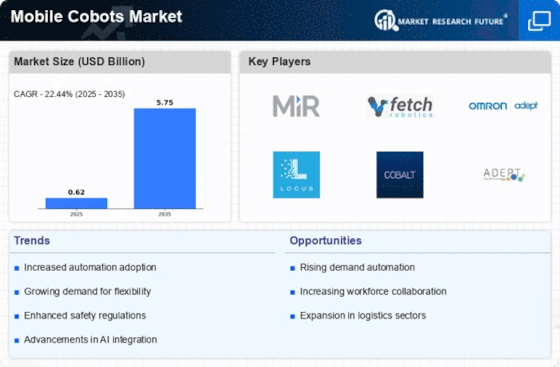Top Industry Leaders in the Mobile Cobots Market
Competitive Landscape of Mobile Cobots Market
The global mobile cobots market is projected to witness explosive growth in the coming years, driven by factors such as the increasing demand for automation in various industries, rising adoption of collaborative robotics, and growing awareness of the benefits mobile cobots offer. With such potential, the market landscape is becoming increasingly competitive, with established players and new entrants vying for a piece of the pie.
Key Players:
- ABB Limited
- Aubo Robotics
- Fanuc Corporation
- Kawada Robotics
- Kuka Ag
- MrRK-Systeme Gmbh
- Precise Automation
- Techman Robot Inc.
- Yaskawa Electric Corporation
- Agilex Robotics (Shenzhen) Ltd
- Robert Bosch Gmbh
- PBA Group
- Staubli International Ag
- Waypoint Robotics
- Robotnik
Strategies Adopted:
The key players in the mobile cobots market are adopting various strategies to maintain their competitive edge. These include:
- Product innovation: Companies are continuously developing new mobile cobots with improved capabilities, features, and functionalities. This includes focusing on aspects like payload capacity, reach, and ease of use.
- Strategic partnerships: Collaborating with other players in the automation ecosystem, such as software developers, system integrators, and component providers, allows companies to offer more comprehensive solutions and expand their reach.
- Expansion into new markets: Recognizing the potential of emerging markets, established players are actively expanding their presence in these regions. This involves establishing local partnerships, adapting products to local regulations, and tailoring marketing strategies.
- Focus on specific applications: Companies are increasingly focusing on developing mobile cobots optimized for specific applications within verticals like automotive, healthcare, and logistics. This deep industry expertise allows them to cater to the unique needs of their target markets.
Factors for Market Share Analysis:
Several factors influence the market share of different players in the mobile cobots market. These include:
- Brand recognition and reputation: Established players with a strong brand and positive reputation enjoy a significant advantage in attracting customers.
- Product portfolio breadth and depth: Companies with a wider range of mobile cobots cater to diverse needs and preferences, leading to a larger market share.
- Pricing strategy: Competitive pricing strategies are key to attracting cost-conscious customers, especially in price-sensitive markets.
- Distribution network: A robust and well-established distribution network ensures wider product reach and facilitates faster delivery and service support.
- Technology leadership: Companies investing heavily in R&D and continuously innovating are likely to maintain a leading position in the market.
New and Emerging Companies:
Several new and emerging companies are entering the mobile cobots market, bringing fresh ideas and disrupting the established landscape. These companies often focus on:
- Specialization: Developing niche solutions tailored to specific applications or industries.
- Affordability: Offering cost-effective mobile cobots targeted at small and medium-sized businesses.
- Open-source platforms: Providing open-source software and hardware platforms, allowing for customization and integration with other systems.
- Cloud-based solutions: Offering cloud-based control and management systems for easy deployment and remote monitoring.
These new entrants are challenging established players by offering innovative solutions at competitive prices, catering to unmet needs, and leveraging emerging technologies like artificial intelligence and machine learning.
Current Investment Trends:
Companies in the mobile cobots market are currently investing in various areas, including:
- R&D: Developing next-generation mobile cobots with enhanced capabilities, improved safety features, and advanced functionalities.
- Software and AI: Investing in software platforms for mobile cobots, including user-friendly programming interfaces, advanced vision systems, and AI-powered decision-making capabilities.
- Subscription models: Exploring subscription-based business models to provide access to mobile cobots as a service, offering greater flexibility and affordability for customers.
- Digitalization: Investing in digital tools and platforms to improve customer service, provide remote support, and enable data-driven decision-making.
Latest Company Updates:
October 2023 Hanwha Group based in South Korea has created a subsidiary which oversees the cobots business. With an aim to target the worldwide market, this latest subsidiary will create autonomous collaborative robots which can work with the human co-workers in an array of sectors including food service and security.
The company is betting large on the robotics technology in expectation of the worldwide robot market’s huge growth propelled by the burgeoning need for IoT and AI-powered smart factories as well as contactless services after the outbreak of the COVID-19 epidemic. The collaborative robots can in fact work with humans in a shared space or in a situation where robots and humans are nearby. Such cobots are getting more innovative and advanced with big data and artificial intelligence.
The Hanwha Robotics had been introduced for expanding their cobot business. The subsidiary had been set up via separating the sections in charge of the automated guide vehicles and manufacturing cobots from the factory automation division of Hanwha Momentum. The company holds 68% stake of the cobot producer and 32% stake in fact is owned via Hanwha Hotels and Resorts, Hanwha’s hospitality wing.
The latest cobot can aid Hanwha Hotels and Resorts in the domains of security, facility management, and cooking. The head of the company stated that they will create robots which can be utilized in many varied areas namely security and food tech. His aim is in offering novel robots for industries with higher safety risks & manpower shortages.










